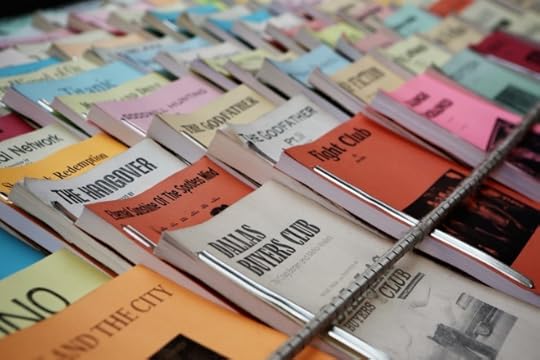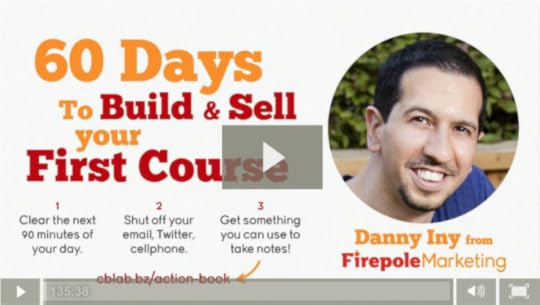Jeff Goins's Blog, page 48
October 28, 2015
079: Lessons from Creating a Conference from Scratch in Three Months [Podcast]
When you’re standing on the edge of the unknown, it’s natural to be afraid and shy away from the light of possibilities. The worst thing you can do in those moments is let shame steal your chance to shine.
Do you remember the first time you tried something big and new? The sting of anxiety in the pit of your stomach. A sense of excitement for what might happen. The hairs on your arm standing up as you prepare to make the leap.
This year, I tried something I’ve never done before and it was terrifying.
This week on The Portfolio Life, Andy and I talk about my fears before Tribe Conference, a few of my favorite parts of the event, and some helpful advice on working through shame. Listen in as we get inside the mind of a conference organizer and look forward to next year.
Listen to the podcast
To listen to the show, click the player below (If you are reading this via email, please click here).
Brace yourself for the unexpected win
In the days leading up to the very first Tribe Conference I was a nervous wreck. With about three months of preparation, we were hosting 150 attendees and over a dozen speakers at The Factory just outside Nashville, TN.
Fear attacked from every side and I didn’t stand a chance. Would everyone show up? Would the speakers go over their time limits? Would people ask for refunds and I’d go broke? Would everything fall apart and I’d end up a failure?
My therapist asked, “So, why are you afraid?” It boiled down to fearing the disappointment of attendees and losing the respect of people I admired.
What he said in response to my fear was it sounded like shame. And that, “S.H.A.M.E. stands for: Should Have Already Mastered Everything.”
He encouraged me to let go of the misguided expectations that I should be great at all these things I’ve never done before, and instead brace for the possibility everything will go better than planned.
And you know what? It did. Tribe Conference was a lot of fun for our team, and everyone I got a chance to talk with loved the event.
It’s easy to fear the unexpected and prepare for the worst. You may find your success rate is much better when you prepare for the best.
Show highlights
In this episode, we discuss:
Common fears of conference organizers
The stress of coordinating multiple moving parts
Preparing for irrational failure
When your identity gets tied up in success
Assuming you should be good at things you’re not
Bracing yourself for possibility of winning it big
Discovering freedom by giving yourself permission
The hidden ROI of therapy for creatives
A simple secret to creating wow moments
Why bigger events aren’t necessarily better
Takeaways
Let go of perfect.
Embrace the mess.
Find joy in fun surprises.
Community is encouraged when everyone has the same access to information.
S.H.A.M.E. stands for: Should Have Already Mastered Everything.
Resources
Tribe Conference
Download the full interview transcript
Bonus: Get free access to a new Tribe Writers video series. Enter your email here to reserve your spot and I’ll email you as soon as the first video is available.
What were you afraid to start? How’s it going? What are you afraid to start now? Share in the comments

October 26, 2015
Get Rich Quick Schemes, Instant Fame, and Other Lies from the Internet
Recently, I was speaking at a conference in Canada and the event planner said she was surprised nobody had ever heard of me. I wasn’t. Most people have no idea who I am, and that’s okay.
The Internet has ruined us for humility. Because of social media metrics, we assume that people have heard of us. We believe we are bigger deal than we really are. Internet fame is a funny thing.
I didn’t always understand this. After first starting a blog, I wanted people to notice me in public. I thought because I had a Twitter handle, that somehow made me an important person.
Bonus: Download Every Writer Needs a Tribe for free.
The safest assumption to make
Just as I was about to give one of the biggest speeches of my life, my friend Jon Acuff said:
Don’t forget, most people have never heard of you. Always assume the audience doesn’t know who you are.
That’s a wonderful thought, isn’t it? What if instead of introducing ourselves with “If you haven’t heard of me…” we said, “You probably have no idea who I am…”?
This is just one of a few fights I want to pick with the world of Internet marketing and other lies you and I have been fed recently.
Tired of the lies? Me too…
Marketers ruin everything.
—Gary Vaynerchuk
If your Facebook feed and email inbox look anything like mine, you are constantly inundated with promises that seem too good to be true.
So let me just tell you: they are.
The promise that you can build a website in 48 hours and start earning a passive income without having to lift a finger? Too good to be true.
The guarantee that if you buy this product you’ll lose 100 pounds in 8 minutes? It’s too good to be true.
The commitment to teach you everything you need to know to become a millionaire in a month? You guessed it.
Next week, I’m going to do a free video class un-teaching you all those things you may have heard from marketers who don’t always have your best interest at heart. If you’re tired of hearing empty promises and inflated success stories, you’re not going to want to miss this.
You and I have been sold a pack of lies that is doing us more harm than good. The Internet is an amazing tool, something that has literally changed my life. But too many marketers are using it to manipulate people and leave them high and dry.
Frankly, it’s time someone told the truth.
The truth nobody wants to tell you
You can think of this series as an anti-marketing message. I’m distilling everything I’ve learned in the past decade as a marketer, even the slimy stuff nobody wants to tell you, and sharing what I’ve been teaching Tribe Writers for three years.
In a nutshell, here’s the truth:
Success isn’t easy. It takes hard work, but is worth it in the end.
Nobody cares about you. Of course, your mom and Aunt Phyllis care about you. But the random person on the Internet doesn’t know you or care about you — until you give them a reason to. Influence isn’t a given; it’s something you earn.
The world doesn’t owe you anything. You aren’t guaranteed success. But you are given a chance. And those who add the most value get their reward.
So how’s that for under promising? If those sound attractive to you, then I encourage you to sign up for this free class.
What you’ll learn
In this three-part video series, I will share with you what I know. I’ll tell you what I’ve done to build a million dollar business, create a powerful tribe of millions of followers, and become a best selling author of four books.
But I’m not going to promise you the moon. This will only be as valuable as what you point into it. Here’s what we will cover:
How to get your 1000 true fans
How to make your first $1000 online
What it takes to build an online platform worth noticing
Why am I doing this?
Once or twice a year I teach an online course called Tribe Writers, and we’re about to open registration for the last time this year. Before we do that, I am compressing everything from that eight-week course into a short series of lessons you can start applying immediately.
The point is to help you implement the process I teach in these videos, and begin getting the results you want. You’ll get a taste of Tribe Writers to see if it’s something you want to sign up for.
Bonus: Enter your email here, and you’ll immediately get my free eBook, Every Writer Needs a Tribe , and I’ll email you as soon as the first video is available.
What marketing lies are you tired of hearing? Are you ready to discover the hard, but rewarding truth of building a tribe? Share in the comments.

October 23, 2015
How to Move from Good to Great
Legendary NFL running back, Walter Payton, pointed out, “When you’re good at something, you’ll tell everyone. When you’re great at something, they’ll tell you.”
So how do you go from good to great?
I’ve asked this question for years. Actually, I’ve been obsessed with greatness since I was a kid. At first, I focused only on athletic greatness.
It was my outlet and sanctuary from the frustration, anger, and sadness of a rough family situation, no friends, and the nightmare of trying to get good grades while battling dyslexia in school.
But after reaching those initial athletic goals of becoming All-American and breaking a world record in football, I was still seeking greatness. There had to be more to it than physical prowess.
It wasn’t until I started my podcast, The School of Greatness, that I started to feed the deep hunger for this knowledge. I’ve had the privilege to interview some of the most brilliant and inspiring minds in fitness, entrepreneurship, creativity, and spirituality and I’m only 250 episodes in.
As a way to keep track of all the notes I’ve been taking in this school, as well as share them with the world, I’ve written a book of the top 8 lessons so far about what it takes to be great.
Here they are, with quotes from my “professors” on what they have learned differentiates good from great.
1. Create a vision
Without a crystal clear vision of what you are going to accomplish, you won’t know where to start. This is essential, but it doesn’t have to happen overnight. Work on your vision every day and let it evolve as you learn and progress down your path.
Find what you’re passionate about and be brave enough to pursue it as your life’s work.
—Michele Promaulayko, Editor in Chief, Yahoo! Health
2. Turn adversity into advantage
As soon as you realize you have a choice in adversity, you also realize you are in control. The biggest lessons usually come from the biggest failures, so learn to see failures as feedback. That’s the kind of insight that can show you your next move.
Those people that buck back, it’s just amazing to see the levels they rise to. They are fearless in what they share.
—Tim Larkin, New York Times bestselling Author, Top Self-Defense Coach
3. Cultivate a champion mindset
Reconnect with your strengths, your passion, and your ambition and cement those into your mindset. You have to believe you are capable of achieving greatness before you have the proof that you are.
Make a daily practice of visualizing yourself in your greatest form.
Have pride in yourself and know you couldn’t have done anything more.
—Shawn Johnson, Gymnast, Olympic Gold Medalist
4. Develop hustle
When you hustle you are in good company; it’s how all the A players got to where they are. Hustle is what sets apart the good from the great.
Results speak for themselves.
Heart and hustle beat intelligence all day long.
—Fabio Viviani, Top Chef Star and Restaurateur
5. Master your body
The truth is, your body is the vehicle that allows you to do what you were born to do. Once you respect it, you’ll find the discipline to take care of your body and constantly work on improving it.
If you don’t have what you want and your body isn’t in the condition you wish it were, it’s a guarantee those two things are related.
Doing stuff I don’t want to do is greatness.
—Joe De Sena, Founder, Spartan Races
6. Practice positive habits
A huge part of greatness is using our ability to form habits to our advantage. The less energy you have to spend on making small daily decisions, the more you have to create something new.
Create healthy, productive routines and treat them as essential to your livelihood.
You are what you do everyday.
—Jon Chu, Hollywood Film Director
7. Build a winning team
Playing solo (AKA perfectionism) might have gotten you this far, but it’s not going to get you to your full potential. Invest in relationships that you can add a lot to and that you can receive a lot from.
Surround yourself with people who are strong where you are weak.
Inspire others to take risks, push their boundaries and become greater than they ever thought they could be.
—Adam Braun, Founder, Pencils of Promise
8. Be of service to others
You’ll discover quickly that greatness which only serves you is empty. Serving others with your talents and resources is what makes a good person a great person.
No matter where you are in your journey, it’s never too early to start making service a part of it.
Greatness is impact and impact is service.
—Keith Ferrazzi, Author, Never Eat Alone
 Lewis’s newest book, The School of Greatness, provides a framework for achieving real, sustainable, repeatable success. You get the tools, knowledge and actionable resources to take your vision and turn it into a reality.
Lewis’s newest book, The School of Greatness, provides a framework for achieving real, sustainable, repeatable success. You get the tools, knowledge and actionable resources to take your vision and turn it into a reality.
How are you pursuing greatness? What is the difference between good and great? Share in the comments.

October 21, 2015
078: Use Sketchnotes to Deliberately Capture Meaningful Ideas: Interview with Mike Rohde [Podcast]
Too many aspiring authors try to write a book they hope the world will read. They fail to realize writing to everyone is the fastest way to ensure no one reads their book at all.
With over 350 million copies of his books sold, Stephen King reveals in On Writing that he writes to one person, his wife. King recognizes his words will lose all meaning and resonance if he tries to write for everyone.
The secret here is that constraints foster creativity rather than suppress it. By narrowing the focus of your audience you can harness a creative power bursting to pour words onto the page.
This week on The Portfolio Life, Mike and I talk about how you can capture ideas more effectively and how to run a business within the constraints of a full-time job.
Listen in as we discuss how creativity is unlocked in the balance between the artistic and business sides of your portfolio.
Listen to the podcast
To listen to the show, click the player below (If you are reading this via email, please click here).
Get a smaller toolbox
It’s hard to keep track of everything we’re interested in. Writing, blogging, photography, painting, drawing, computers, programming, travel, and hoarding notebooks. No? Just me on that last one?
We are not designed for a singular function. Our calling may have direction, but the path to get there rarely involves a solitary skill we must master. Instead, we must draw on our portfolio of experiences and acquired skills to achieve our aim.
In our pursuits, it’s tempting to try everything, but the compulsive wanderer rarely creates lasting art. To hone your craft requires focus and diligence to do hard work over time.
With new applications and tools developed every day, it’s easy to get distracted by all the options. We fall into the trap of experimenting with each new shiny toy or get frozen with fear, overwhelmed we might make the wrong choice and instead decide not to create at all.
One of the things I found most interesting about Mike is the balance between his openness to test new tools and a bias for creative action.
You can’t get much more simple than pen and paper, but Mike creates sketchnotes that capture compelling ideas in an accessible format.
You may need to stop looking for the right tool and just get to work.
Show highlights
In this episode, Mike and I discuss:
Creating art without Photoshop
Observing other people develop solutions to problems
The lie everyone tells themselves about note taking
Self-inflicting constraints to promote creativity
A deliberate approach to capturing ideas
Intentionally deciding what not to pay attention to
Why technology will never completely replace pen and paper
How two channels of your brain work together to create a matrix of memory
Caching (or staking) ideas as they come so you don’t lose them
Managing the constraints of work, life, and creative pursuits
Quotes and Takeaways
”Grace is really important for yourself. And that includes your drawing ability.” —Mike Rohde
Technology is antagonistic to creativity. Force yourself to be creative with fewer tools.
“Crank everyday on a little bit of something and move the process forward.” —Mike Rohde
Art always emerges from constraints. Art comes out of the margins of your life.
Leverage limitations to your advantage. Learn to create within constraints.
Life is an experiment. Explore and play to discover what works for you.
Resources
The Sketchnote Handbook by Mike Rohde
The Sketchnote Workbook by Mike Rohde
Notebooks: Moleskine, Baron Fig, Field Notes, The Hobonichi Techo
Pens/Pencils: Pilot G2, Pentel EnerGel 0.7, Retro 51
Rework by Jason Fried and David Heinemeier Hansson
The $100 Startup by Chris Guillebeau
A Little Book of Talent by Daniel Coyle
The Crossroads of Should and Must by Elle Luna
The Age of Unreason by Charles Handy
BONUS: Download the full interview transcript here.
Have you tried sketchnoting? What constraints are you facing? How do they boost your creativity? Share in the comments

October 14, 2015
077: Intentionally Choosing Your Path Instead of Dying a Slow Death: Interview with Paul Angone [Podcast]
The average 2015 graduate walked off the commencement stage with over $30,000 of student loan debt. You don’t need a degree in mathematics to realize something isn’t adding up.
The 20th Century was in part an era of false belief. The influence of the industrial age allowed companies to treat people like cogs in a machine. Institutions of higher learning churned out qualified workers and graduates were promised a bright future.
In the last decade, those promises are increasingly empty.
Paul Angone, a former college recruiter turned author and entrepreneur, knows the fear of post graduate life first hand.
This week on The Portfolio Life, Paul and I talk about how to find success and wake up from the nightmare of normalcy. Listen in as we share how you can stick out, find the work you’re meant to do, and accomplish your goals the context of today’s economy.
Listen to the podcast
To listen to the show, click the player below (If you are reading this via email, please click here).
You can also listen via iTunes or on Stitcher.
Detonating the American dream
Growing up my dad drilled three words of advice into our heads more than anything else:
Go to college.
A Bachelor’s degree used to be a golden ticket. Graduating seniors were faced with multiple offers as companies fought for educated talent.
Sounds like a fantasy now, doesn’t it?
The college years are formative for young people because it provides a transitional escape from reality. It’s a season of self-discovery and finding your place in the world.
Unfortunately, the price tag is rising each year and students aren’t leaving college any better prepared to face life than their first day freshman year.
When I attended college, there were no viable options to forego the experience. I graduated on the cusp of new learning mediums. We live in the most connected time in history with a vast wealth of knowledge available at our fingertips.
Education is important. Learning how to learn is vital. But you don’t need to spend 4 years and your life savings to obtain it.
Not anymore.
Show highlights
In this episode, Paul and I discuss:
Navigating the tension of passion and practicality
Viewing your 20s as a season of investment
Getting uncomfortable with the comfort zone
The wisdom of settling for a season to avoid settling forever
Having the courage to get lost
The difference between a slow death and an intentional one
Brutal transitions and the failure of institutional learning
The proprietary nature of information products
The power of verbally affirming your life’s work
Setting the table vs enjoying the feast
Quotes and Takeaways
”Drowning in options is a terrible way to die.” —Paul Angone
Help people discover their own way while you discover your own way.
“The first step to exploring is getting lost.” —Paul Angone
Your 20s are a series of internships. Pick something and master it.
“Failure is the best qualifier.” —Paul Angone
Access to everything may lead to choosing nothing.
We may all be saying the same thing, but we’re not saying it the same way.
Resources
Signature Sauce
The Millionaire Messenger by Brendon Burchard
All Groan Up by Paul Angone
BONUS: Download the full interview transcript here.
Are you stuck in the slow death of normalcy? Or have you found a way to break through and live a more fulfilling life? Share in the comments

October 12, 2015
The Surprising Self-Discovery Lessons of Blogging (Plus a Challenge!)
I am a writer. It’s what I do. But the truth is I didn’t learn this truth about myself and then go do it. Confidence came slowly and awkwardly. The epiphany didn’t precede action; it followed it. And I learned a lot of this from blogging.

Photo Credit: angelocesare via Compfight cc
I love writing, not just because it’s my job, but because it’s a tool to help you better understand yourself. Sharing my thoughts on this blog helped me understand that writing isn’t just something I do; it’s who I am.
This, it seems, is true for others, as well. Flannery O’Connor said that she never knew what she thought until she read what she wrote. Writing and journaling, even blogging, can be a means of self-discovery.
Why writing?
Here’s why writing is a powerful self-discovery tool:
Writing is honest. It’s something you do in solitude, which means that in that privacy you can be a little more truthful than you might normally be.
Writing vulnerable. When you put words to paper (or on screen), you share a part of yourself that the world doesn’t normally get to be. You stop hiding behind your shadow self and reveal who you really are.
Writing is a process. It takes time, and with that time comes revelation. You understand yourself in ways that you wouldn’t normally consider, because you’re forced to work through your ideas and thoughts in a slow, methodical process.
When I began blogging, I realized that I wrote first for myself and second for an audience. As big as I am on helping others and serving your readers, there’s something cathartic about writing just for the sake of writing.
If you’ve ever wondered what your place is in the world, if you’ve considered the possibility that you might have a calling – some purpose that’s bigger than you — then maybe it’s time you started a blog.
A free challenge: Intentional Blogging
I’m dubbing October “Intentional Blogging” Month. This is something I do once a year, and every time it goes over really well.
For the rest of the month, I’m going to be leading a group of people who want to get serious about blogging and are willing to let the process teach them something about themselves. And it won’t cost you a thing.
If you join this free challenge, you’ll get exclusive access to me, a 12-part blogging course, and opportunities to connect and share your work with other bloggers through a private community. You can jump in at any point, but it’s best to get started sooner than later.
So what do you need?
You don’t have to be a great writer to start a blog.
You don’t need a plan or a big budget.
You don’t even need to have any aspirations of making a ton of money.
You just need to want to grow. Whether you don’t have a blog, are just getting started, or want to take your blog to the next level, this challenge will help you.
I promise you: blogging will push you and challenge you in ways that you’ve never before experienced. It certainly has for me. And you just might learn something about yourself that surprises you.
What to do next
The “rules” for this are pretty simple: do one thing every day for the rest of the month to grow your blog. If you want to jump in, here’s what you need to do:
Join the challenge (be sure to enter your email address for some free resources including a free, 12-day email course).
Make sure you’re set up with a blog (watch the video on that page for step-by-step instructions).
Leave a comment on this post, saying you’re in.
By the way, you don’t have to blog every day to be part of this challenge. These will be very small steps to start a blog and then take it to the next level. You’ll get one email per day for 12 days and I’ll occasionally pop into the community to share some bonus lessons and resources.
We start immediately (on October 12 if you’re reading this later), but you’re welcome to jump in at any point this month.
What do you hope to learn about yourself from this blogging journey? Share in the comments.

October 7, 2015
076: Your Voice is Louder than Words: Interview with Todd Henry
Most creatives think finding their voice is as simple as digging it up in the backyard. But the reality is this process is shrouded in a lot more mystery.
My friend, Todd Henry believes your voice is developed in layers. It’s something you uncover and develop over time. Ultimately, it’s how your collective body of work speaks. It is louder than your words and bigger than a single event. I like that.
This week on The Portfolio Life, Todd and I talk about using your voice to create lasting impact. Listen in as we explore deep ideas like active patience, authenticity, and vision.
Listen to the podcast
To listen to the show, click the player below (If you are reading this via email, please click here).
You can also listen via iTunes or on Stitcher.
Fear disguised as wisdom
Soon after starting work at a non-profit, I was promoted to marketing director. In this role I created a new department and had a lot of fresh ideas.
Once in awhile, veteran employees took me aside to share how they’d seen it all before, and what we were trying to do wouldn’t last, that this was another pet project doomed to fail. While they probably had good intentions for sharing these words of caution and saw them as wisdom, I took it as a dare to succeed.
Today, most of the naysayers aren’t around anymore. They were either let go or left the organization while my team worked hard to create lasting impact. Stasis feels like that safest thing, but there’s a risk to standing still, as well.
Show highlights
In this episode, Todd and I discuss:
Redefining the meaning of “voice”
Sensitivity to whatever audience you’re in front of
Taking big ideas and connecting them to different contexts
When people consider you, what do they think about you?
Shaping and honing a voice that represents you
How your voice reflects your body of work
The danger of compliance, conformity, and compromise
Anticipating hurdles on the journey
The paralysis of false narratives
How success amplifies the imposter syndrome
Sacrificing short-term attention for long-term impact
Three higher order patters of the “voice engine”
Quotes and Takeaways
“Fear often comes disguised as wisdom.” —Todd Henry
“We discover our voice in the context of community.” —Todd Henry
“Making great art is making bold decisions in the face of uncertainty.” —Todd Henry
“Be clear even when you’re not certain.” —Todd Henry
You can’t find your voice buried in the backyard.
Your voice is a means for creating impact, not achieving self-gratification.
The job of the artist is to tell the truth.
Writing is work. The muse isn’t going to kiss you with the fairy dust of inspiration while you binge on Netflix.
Resources
Louder than Words: Harness the Power of Your Authentic Voice by Todd Henry
Todd Henry’s blog
BONUS: Download the full transcript here.
What is your voice saying about your work? What does your work want to become? Share in the comments

October 3, 2015
A Simple Secret to Success: Teach What You Know
There are so many people out there these days who want to sell you something they have no right trying to sell. And ironically, it seems that the most qualified experts are often the quietest voices. So how do we fix this?

I have a simple suggestion: Teach what you know. Here’s why this works:
If we all taught what we knew, we would waste a lot less time trying to impress other people, pretending to be smarter than we really are.
If we all taught what we knew and didn’t hoard our knowledge, we would all be smarter.
If we all taught what we knew, those around us would value what we offer more.
This is harder than it sounds, though, because we all suffer from the curse of knowledge. We are too close to the things that we know to even recognize their value. So we need a little perspective.
I love what Derek Sivers says about this: “What’s obvious to you is amazing to others.” If you know more than most people about something, then you are an expert to someone. And that means you have a responsibility to share with them what you know.
““What’s obvious to you is amazing to others.”Derek SiversTweet thisTweet
So let’s say you have some gem of an idea that you may not even realize you have. How do you get started on teaching what you know? Here are a few quick tips:
Write a book. I’m a big fan of this, obviously, as I’ve written four books already in the past three years. I think there’s no better way to figure out what you think about something than to write a book. And just between you and me, I like writing books because it forces me to learn things better than I really know them. So even if you’re not an expert, if you have an appetite to learn, writing a book is not a bad idea. The best place to begin is with a daily writing habit 500 words per day.
Speak at an event. There’s a reason why the Greeks use to gather in public squares to debate philosophy and why politicians travel from city to city to win over voters. The best way to spread an idea is still via word of mouth. If you have something to teach or share, getting in front of an audience and telling them about is a great way to do this. I love going to conferences and events to share my ideas and stories. And honestly, getting booked to speak isn’t as hard as you think.
Teach a course. It could at your church or place of worship, the local community college, or even online. I’ve made a good living sharing unexceptional things with an audience of people who find them interesting – all through online courses. It’s humbling, but also incredibly energizing. Teaching courses like Tribe Writers has got to be some of the most fulfilling work I’ve ever done.
You don’t need more information. You need to stop stalling and share what you know. If it resonates with someone, ask them to share it. Before you know it, you’ll be reaching people you never knew existed needed your message
Some people say success follows passion. But I don’t think that’s true. Success follows value. And teaching what you know just might be the best way to create value.
““Success doesn’t follow passion. It follows value.”Jeff GoinsTweet thisTweet
If you don’t know where to start, here are three practical suggestions:
If you want to write a book, you need to start writing daily. Join the My 500 Words daily writing prompt. You’ll get a short email prompt every day for 31 days plus free access to an online community of other writers who can encourage you. It’s one of my favorite communities online.
If you want to speak, sign up for the free webinar I’ll be hosting with Grant Baldwin later this week about getting booked and paid to speak. He is the expert on this and has been doing it for a decade. I’m a firm believer that writers need to speak, and Grant will teach you how to do it right.
If you want to build and sell an online course, don’t miss Course Builder’s Lab. It’s the best education I’ve ever seen on how to do this the right way. You’re also guaranteed to make $2000 in the first 60 days or you’ll get a full refund. And if you sign up before the deadline, I’m going to send you three bonuses: the Intentional Blog Course (a $200 value), the Art of Work Course (a $400 value), and a copy of my best-selling book, The Art of Work. The deadline is Oct. 4 at 11:59 p.m. Sign up here. (Full disclosure: I’m an affiliate for Danny, which means I get a commission if you sign up through that link, but remember that I don’t endorse anything I don’t stand by 100%. Danny’s course definitely fits that criteria).
Whatever you do, don’t just sit there. Teach what you know.
How can you start doing this today? Share in the comments. I’ll be randomly picking people who take action and giving away special prizes, like books and stuff.

September 30, 2015
075: How to Get Booked and Paid to Speak: Interview with Grant Baldwin
Despite outranking death as a fear, public speaking is a popular life goal for many people. The next worse fear is explaining what they want to speak about.
It seems strange to want to be a speaker and not know the why, what, or who behind the drive. There’s an adrenaline rush when you get to connect with an audience, but you’ll fall flat without enough self-awareness.
As a full-time speaker, Grant Baldwin has presented at 400+ engagements to over 350,000 people. Grant knows his purpose, his message, and the best target market.
This week on The Portfolio Life, Grant and I talk about becoming a better speaker and a practical way to make a living with your message. Listen in as we discuss trial by fire and a specific audience that forces any speaker to improve.
Listen to the podcast
To listen to the show, click the player below (If you are reading this via email, please click here).
You can also listen via iTunes or on Stitcher.
The art of making a bold ask
A few months ago, we got the great idea to host the first ever Tribe Conference just outside of Nashville. Besides a venue and attendees, one of the essential elements of a conference is speakers.
For anyone who watched the closing keynote live or online via the stream, you know Grant killed it. He had the daunting task of being last in a lineup of great speakers and he brought us all home in style.
What you may not know is that I didn’t ask Grant to speak at Tribe Conference. In fact, before that afternoon at The Factory I’d never seen Grant speak live before.
So how did Grant land the closing keynote? He asked. There’s a little more to it than that, but making the ask played a major factor in Grant speaking at our event.
Grant has proven himself for years as a competent speaker with a portfolio of experience and skills. And perhaps even more valuable than that, we’re friends. Grant invested in relationship with no ulterior motives a year before Tribe Conference was even planned.
One of the things I find most interesting about successful speakers is their hustle for relationships. Even full-time speakers will give presentations for free knowing the return on that investment will pay strong dividends down the road.
I think Grant said it best during our interview:
Don’t go after gigs. Go after relationships.
—Grant Baldwin
Show highlights
In this episode, Grant and I discuss:
The best thing about being a speaker
What practice does to prepare you for spontaneity
A trade secret to create a foolproof cue card
Practical ways to make a living with your message
Continuing the conversation around your content
Two essential marketing tools for every public speaker
How doing free gigs leads to large paid audiences
The art of hunting down leads
One type of speaker event planners want to book
Diversifying your portfolio of work
Quotes and Takeaways
”Nothing compares to getting in front of a live audience. It’s all theory until you get on stage.” —Grant Baldwin
The best speeches are practiced and rehearsed, but not scripted.
“People won’t know that you’re a speaker if you don’t tell them you’re a speaker.” —Grant Baldwin
You really don’t become something until you start doing it and acting like it.
“You want to be as good offstage as you’re onstage.” —Grant Baldwin
“Everybody starts at the same spot. Everybody starts at zero.” —Grant Baldwin
Resources
Booked and Paid to Speak webinar with Grant and Jeff
Get Started as a Speaker free course
How Did You Get Into That? podcast with Grant Baldwin
Bonus: Download the full transcript here.
Do you want to be a speaker? Who do you want to reach? What is holding you back? Share in the comments

September 28, 2015
Why You Should Take, and Even Maybe Teach, an Online Course
The Internet is full of cat videos, bad lip readings, and hilarious memes. All good things, of course. But, believe it or not, there’s actually some useful stuff online, too.

Photo Credit: insomniac via Compfight cc
When I set out to start my own online course, I didn’t know much about online education. All I knew was I wanted to deliver a quality learning experience to my readers that went beyond the scope of my blog. And that was about it.
Then in an interview, I heard entrepreneur Ramit Sethi say that before you can charge a certain amount for a information product, you better be willing to pay that much. In this case, he was saying, “Don’t charge $2000 for a course until you spend $2000 and see what a $2000 product looks like.”
So, I started signing up for online courses. And boy, did I learn some things.
The Internet has changed education
This is not like when you were in college and the professor gave you a long, complicated URL to remember to post a weekly assignment. And it’s not like those foreign language correspondence classes you took in high school because no one in your small town taught Latin.
Things have changed. Big time. Now, an online course can be comparable to a real, live educational experience. In fact, sometimes it’s even better.
Let’s say you didn’t go to college. Or maybe like a lot of people you got a degree in one field of study and then figured out what you actually wanted to do. What now?
Well, you used to have two options:
Go back to school and get your degree. In other words, return to the system that didn’t work in the first place.
Read a lot of books and teach yourself (AKA the Good Will Hunting route).
Number 1 is often expensive and doesn’t guarantee you success in the marketplace (which is usually why people go this route). And Number Two is hard. it doesn’t work for people who need a teacher, someone to walk them through the process (and that’s most of us).
So what’s there left to do? Until a few years ago, nothing.
5 reasons to get serious about online learning
The web is exploding with legitimate, online education opportunities. But, you wonder, how can I trust this whole Internet thing with all its cat videos and memes? Good question.
Here are five reasons why you should get serious about online education:
Online courses are less expensive. For a fraction of the cost, you can now get a University-level learning experience taught by industry experts. That is, if you take the right kind of classes (I’ll talk more about that in a minute).
Online courses are more results-oriented. Since you’re likely giving money to someone you’ve never met, online educators are motivated to help you get the results you want (instead of simply teaching dry theory). Their reputations are on the line, after all.
Technology makes the experience of an online course more exciting. Instead of attending a couple 45-minute lectures per week, you now get worksheets, discussion forums, and interactive presentations.
The classrooms are cooler. You no longer have to grab a sack lunch and spend a half-day at your local community college, sitting in a cold, dimly-lit room. You can go attend class right in your living room — whenever you want.
You get to keep the course. This might be my favorite reason. As opposed to traditional education where you the only keepsakes you get are the overpriced textbook and a three-ring notebook full of illegible scribbles, many online courses let you keep a lot of the course material (including the lessons).
If you haven’t considered taking an online course, I seriously think you should. But, and this is important, don’t just sign up for any class that comes along. There’s a lot of swindlers out there (who probably made the cat videos).
Criteria for a good online course
Here’s what to look for:
Credentials. Has the teacher achieved what she claims she has an expertise in? In other words, if you’re taking a course on how to get published, is a published author teaching it? Or at least someone who has had real-life experience in that industry? If other marks of legitimacy (i.e. licenses and such) are needed for what you want to learn, make sure she has those, too.
Testimonials. What do other students say about the course? Don’t just read the landing page copy, though; find some people who have gone through the class and will give you their honest opinion.
Access to the teacher. This is up to you, but I recommend taking a course that gives you some personal access to the teacher. That may mean live video chats or conference calls with other students. Or it could be personal email access when you get stuck. It really depends on the teacher and the material.
Discussion opportunities. One of the best parts of an online course is the opportunity to connect with other students who are going through the same experience as you (this is the best part of any educational experience). Does the course have a forum or Facebook group, a place to ask questions and get help from their peers?
Refund policy. Just like with college, there should be an initial period of time in which you have the freedom to drop your class, if it isn’t what you’d hoped. A 30- to 60-day money-back guarantee is pretty standard.
Notice that I didn’t include price in this list of criteria, and there’s a reason for that. There is no set standard for what an online course should cost. Many four-week courses are $200–$500, but then others range for six to 12 months may cost thousands of dollars.
It depends on your field and what kind of value you place on the information. Just know that taking this course online is typically going to be cheaper than paying for it in person.
“I could do better…”
If you’ve ever taken an online course, you may have noticed that there are some skunks out there.
One thing I noticed is these classes weren’t always worth my money or what I was expecting. There was a lot of hype at the front end, but then when it came time to take the class, the quality was sub-par.
This disappointed and frustrated me. It seemed like some people were using their marketing savviness to take advantage of people who really wanted to learn. I kept saying to myself, “I could do better.”
So one day, I did.
If you find yourself saying the same thing, maybe you should, too. Because it’s not enough to simply say things should be better. Sometimes, we have to be the change we want to see in the world (someone wise said that, I think). Sometimes, our frustration is a sign of what we ought to be doing and aren’t.
To learn everything you need to know to start your own online course, check out Course Builder’s Laboratory from my friend Danny Iny. Don’t wait, though. It’s only available for the next week. To learn more, watch the video below.
Have you ever taken an online course? What was your experience? Share in the comments.












